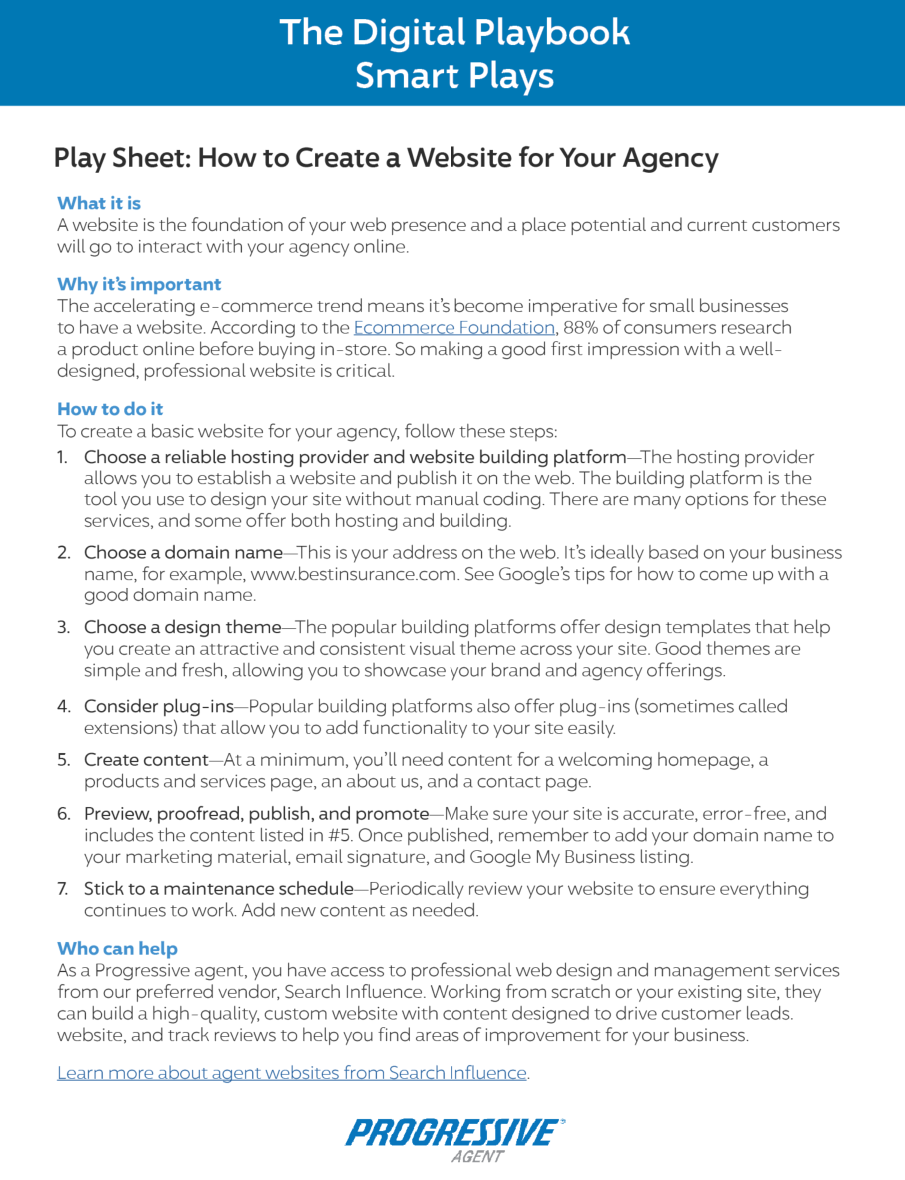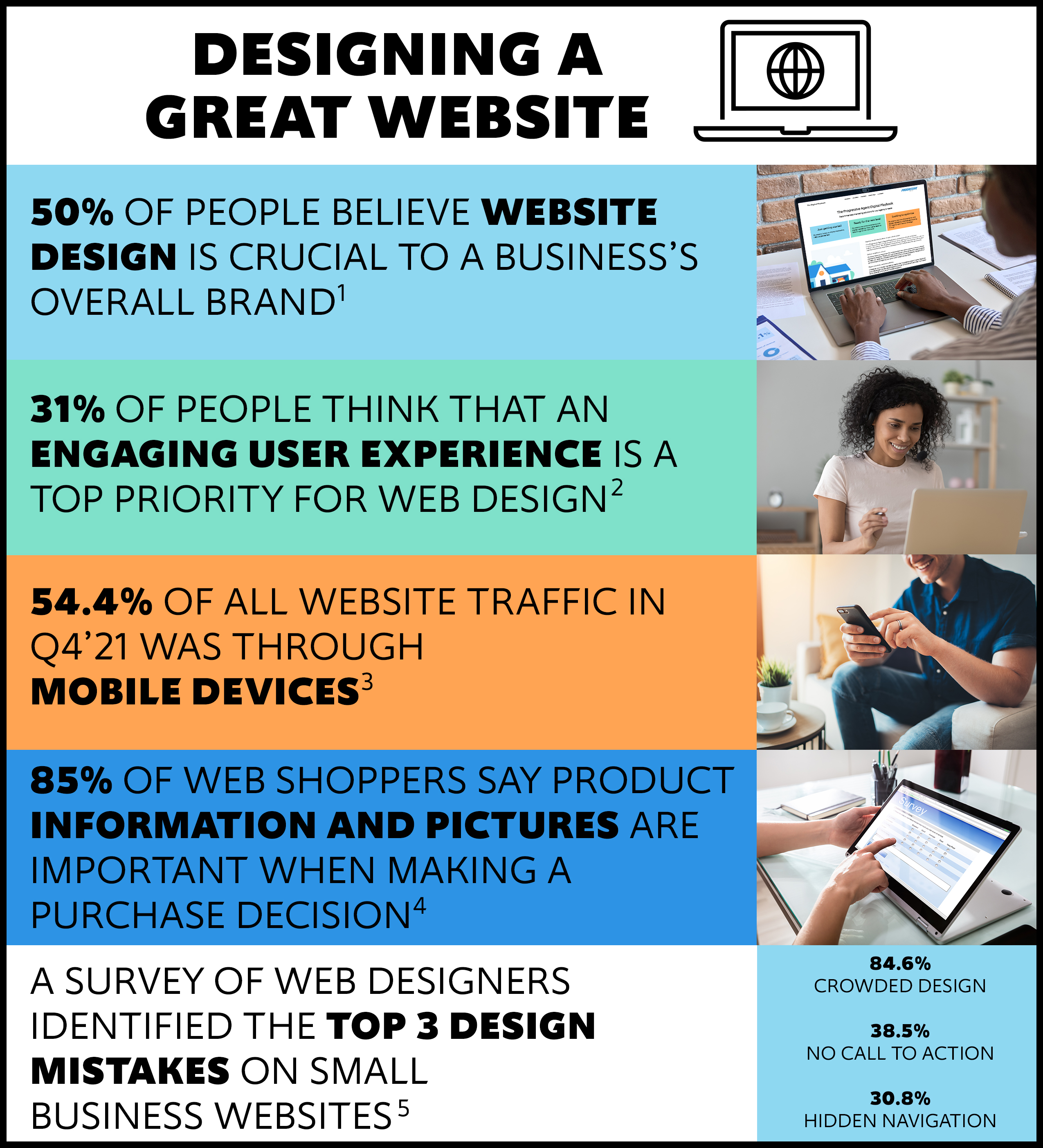With so many of your potential customers looking online for an agency, having an effective website is crucial to the success of your business. If you’re one of the few agencies without a website, let us convince you why it’s worth the investment.
6 Reasons Why Your Agency Needs Its Own Website
As a marketer, you need to reach customers when, where, and how they want to be reached. That means having a strong presence on the web. This is especially true with the acceleration of e-commerce in the pandemic era. It's not to say that your web presence ought to replace your presence in-person and over the phone (or by video chat). Your web presence should, however, highly complement those more traditional forms of contact.
The foundation of your agency’s web presence is your website. You should invest in your website just as you invest in other effective forms of marketing and customer relationship management.
A website is an investment worth making
-
A website provides a critical “first impression” to many insurance shoppers.
Think about the first impression you want customers to have when visiting your office: a convenient location, easy-to-see signage, friendly faces and professional demeanors, a comfortable and uncluttered waiting room, on-time appointments, and so on. All these experiences add up to help customers feel confident about your agency.Your website provides a first impression in the digital realm. It should be easy to find—not only via search but with a memorable URL. Its design should have a professional feel and be optimized for both laptop and mobile screens (mobile optimization is critical, by the way, as approximately two-thirds of searches now happen on mobile devices). It should promote trust using secure socket layer (SSL) technology. And it should make it easy for customers to get the information they need. A professional website is part of an overall professional experience with your agency. It helps customers have that confidence they need to do business with you.
-
A website can improve your showing in Google My Business results.
Google My Business (GMB) is a powerful tool to connect customers to your agency. No, you don’t actually need a website to use GMB. But having one can enhance the experience customers have when they find your GMB listing, as it gives them a link to follow to learn more about your agency. That may often be what’s needed to get them to contact you for a quote.Having a well-crafted website may also help improve your positioning in local search results. According to Google, “prominence” is one of the factors used when determining where to rank a company. They state: “Prominence is … based on information that Google has about a business, from across the web, like links, articles, and directories…. Your position in web results is also a factor, so search engine optimization (SEO) best practices apply.”
-
A website can help differentiate your agency from the competition.
Your website allows you to explain what makes your agency different from the others in town. You can list basics like what lines you offer, what services you provide, and what carriers you represent (and why you represent them). You can also create content that reflects your agency’s values and tells your story while providing helpful information based on the questions your own customers ask. -
A website can help your agency be available at all hours.
Not everyone reaches out to your agency between 9 a.m. and 5 p.m. on weekdays. Having a website with a contact form, including opportunities for customers to request quotes and policy service, allows your agency to expand its availability beyond standard business hours. Of course, you’ll want to be sure you have a process in place to make sure these requests are answered promptly when the office does re-open. -
A website puts you in the driver’s seat of your agency’s digital presence.
It may be tempting to rely on social platforms such as Facebook and LinkedIn when it comes to establishing an online presence for your agency. After all, these sites are relatively easy to use and have billions of users.Resist that temptation.
Yes, Facebook, LinkedIn, and other social media sites are tools that can help promote your agency online. However, they shouldn’t be your primary platform. These sites have rules as to who within those billions can see your content, and those rules don’t always favor business owners. The content you post doesn’t provide much of a boost for your agency’s search engine results. And a website—something you’ve invested in—is simply more credible in the minds of most shoppers than a “free” social media page.
As global content marketing expert Joe Pulizzi often states, “Don’t build your content house on rented land.” Instead, rely on your website—which you own and control—to be at the core of all your online activities.
-
It may be easier than you think to get a professional, well-managed website.
As stated above, your agency’s website is an investment worth making. As with a welcoming storefront, comfortable interior spaces, and customer-focused employees, it’s an investment that helps your agency appeal to more insurance customers.The great news is that as a Progressive agent, you have access to professional web design and management services from our preferred vendor, Lift Local. Working from scratch or your existing site, they can build a high-quality, custom website with site content designed to drive customer leads.
The last two years have accelerated the e-commerce trend. Many people, uncomfortable with or restricted from venturing out, have turned to their screens to shop for a wide range of goods and services. And while an easing of concerns and restrictions has allowed most of us to return to face-to-face interactions, consumers’ pandemic-evolved digital habits have become largely ingrained. Technology is simply an integral part of our lives. Shopping online is taken for granted more than ever.
Agency marketing was becoming more digital long before the pandemic started. But the accelerating e-commerce trend means it’s become imperative to have an online presence. The foundation of that presence should be your agency’s website.
In today’s digital world, your agency website lets potential customers know about your agency and what services you offer. This play sheet provides the steps you'll need to create a basic website for your agency.
A website is the foundation of your web presence and a place potential and current customers will go to interact with your agency online.
The accelerating e-commerce trend means it’s become imperative for small businesses to have a website. According to the Ecommerce Foundation, 88% of consumers research a product online before buying in-store. So making a good first impression with a well-designed, professional website is critical.
-
Choose a reliable hosting provider and website building platform
The hosting provider allows you to establish a website and publish it on the web. The building platform is the tool you use to design your site without manual coding. There are many options for these services, and some offer both hosting and building. -
Choose a domain name
This is your address on the web. It’s ideally based on your business name, for example, www.bestinsurance.com. See Google's tips for how to come up with a good domain name. -
Choose a design theme
The popular building platforms offer design templates that help you create an attractive and consistent visual theme across your site. Good themes are simple and fresh, allowing you to showcase your brand and agency offerings. -
Consider plug-ins
Popular building platforms also offer plug-ins (sometimes called extensions) that allow you to add functionality to your site easily. -
Create content
At a minimum, you’ll need content for a welcoming homepage, a products and services page, an about us, and a contact page. -
Preview, proofread, publish, and promote
Make sure your site is accurate, error-free, and includes the content listed in #5. Once published, remember to add your domain name to your marketing material, email signature, and Google My Business listing. -
Stick to a maintenance schedule
Periodically review your website to ensure everything continues to work. Add new content as needed.
As a Progressive agent, you have access to professional web design and management services from our preferred vendor, Lift Local. Working from scratch or your existing site, they can build a high-quality, custom website with content designed to drive customer leads.
Below you’ll find all the pros and cons for you to decide if you can build and maintain your own website or if it might be a good idea to hire a vendor to make your website a reality.
DIY or Vendor – What to Consider for Building and Maintaining an Agency Website
| DIY | Hire a Vendor | |
| Pros |
|
|
| Cons |
|
|
This infographic illustrates some interesting facts about what web shoppers look at when making a purchase and also, some mistakes designers say are common on small business websites.
|

|
|

|
Copyright 2021. Progressive Casualty Insurance Company. All Rights Reserved

